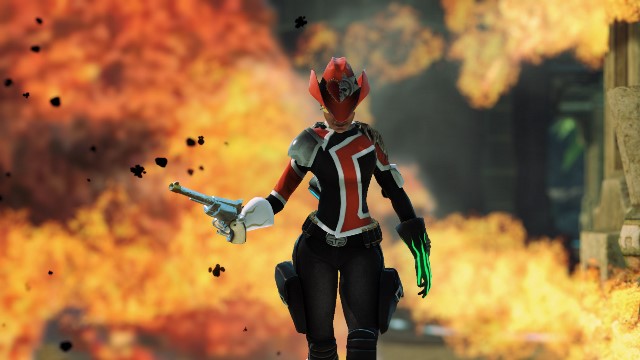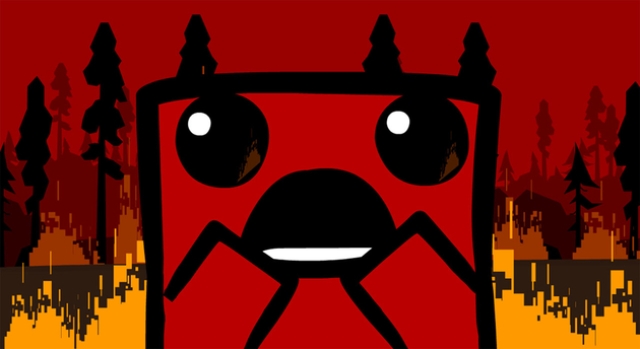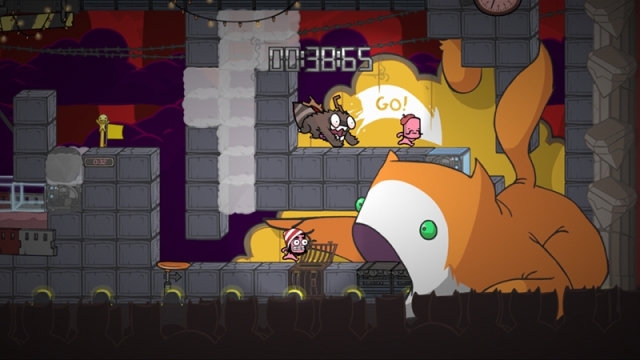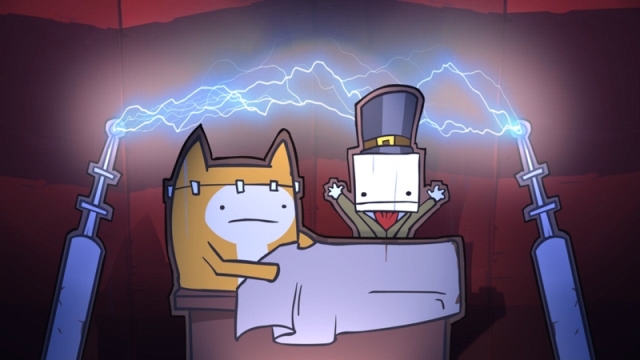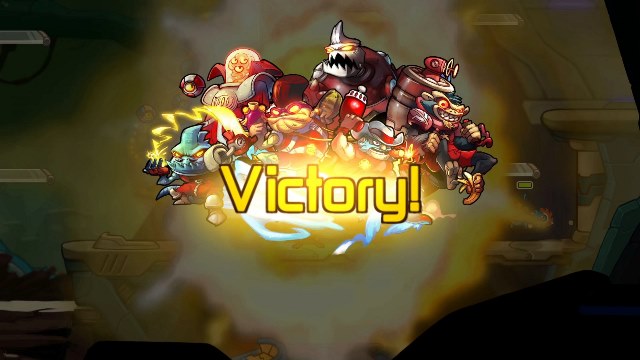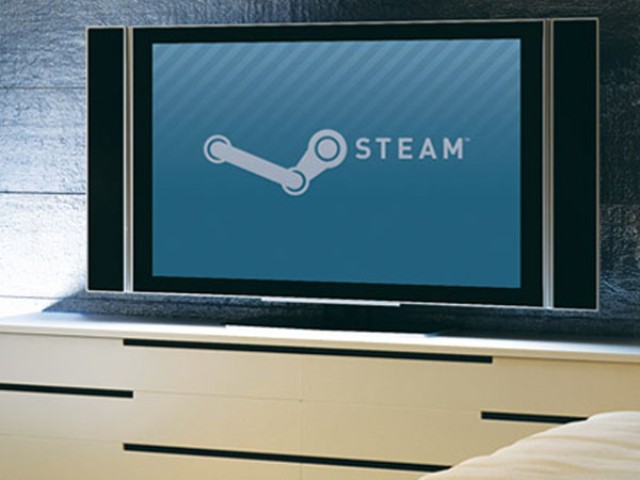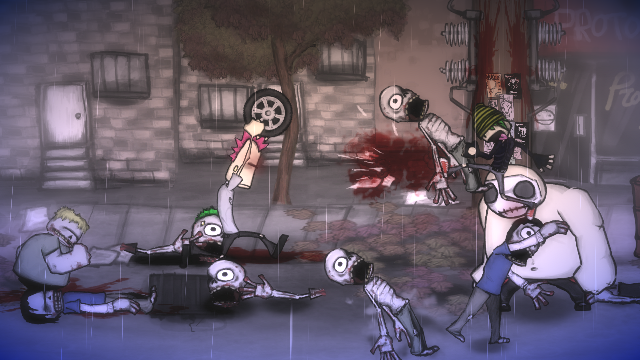For indies, working with Microsoft is a horrifying mess…right?
Dead Space’s Isaac Clarke once had to drill into his own eyeball in order to survive a ship infested with mutated freaks. Altaïr Ibn-La’Ahad of Assassin’s Creed fame was made to part with a portion of one of his fingers in order to join the Levantine Brotherhood of Assassins. Tomb Raider’s Lara Croft once had the misfortune of falling onto a piece of sharpened rebar that pierced her midsection — and all she was trying to do was go for a nice little exploratory boat ride. And that’s not even mentioning the myriad scores of locust soldiers that have found themselves on the wrong end of Marcus Fenix’s trusty chainsaw or colossal boots over the years.
You don’t hear any of them complaining about having to endure those, shall we way, slightly disagreeable circumstances, though, do you? That’s because those mere flesh wounds were nothing when compared to the great tragedy of our time: working with a certain platform holder to release your independent studio’s game on Xbox Live Arcade. I shudder at the very thought.
If you’ve followed Xbox Live Arcade over the past several years here and on other sites, then you already know of what I speak. There lives in Redmond, Washington a great beast, massive in size with glowing red-ringed eyes of fury. It is a devious creature hellbent on tricking those smaller than it into believing they’re partners, only to turn on them in their hour of need, stomping down on their hopes and dreams harder than Fenix has brought down his boots on so many locust heads. Such disdain does this gluttonous monstrosity have for the smaller creatures roaming the forest of the game industry, that it is more than happy to sacrifice its own interests if it means snuffing out the light of those cowering under its great shadow.
So evil is this…Wait. Isn’t this getting just a little out of hand? Is Microsoft really that terrible of a company? Does it truly care nothing for the needs of independent game developers? Is its thirst for video game console dominance so insatiable that it doesn’t mind torpedoing its, um, pursuit of video game console dominance so long as it means making life miserable for independent game studios that, by developing games for its platform, are actively working to help it succeed with its, uh, video game console dominance? It is if you’ve listened to the little guys with big megaphones.
I don’t like you either!
They don’t much care for Microsoft, those poor little fellas whose voices have been magnified by social media platforms and major industry publications. And if you listen to them, you’ll likely conclude that some of their complaints are indeed valid. Take Uber Entertainment’s Chandana Ekanayake, Bob Berry and Johathan Mavor, for example. The trio recently told Polygon a horror story with Microsoft’s arduous patch process and elongated publishing negotiations doing the scaring. The Monday Night Combat developer elected not to return to that old haunt that is Xbox Live Arcade with its next game. Super Monday Night Combat released exclusively on PC as a free-to-play title.
Their tale is fascinating and a bit sad, but it’s far from unique. Braid creator and noted Microsoft detractor Jonathan Blow had some not-so-nice things to say about Microsoft in the wake of that story’s publication in March. Blow publicly picked a few bones with Microsoft on Twitter along with Berry and Ekanayake. He accused the publisher of creating “a great deal of ill will,” lacking a global view and driving developers to competing platforms.
Answering what seemed to be a rhetorical question from Blow, Berry posited that the reason Microsoft treats indies poorly is that “they believe there will always be new teams to exploit. As long as devs keep signing, it wont [sic] change.”
The Polygon story and the ensuing tweets came just weeks after Blow and Super Meat Boy creators Edmund McMillen and Tommy Refenes told Edge and Eurogamer, respectively, that they would not be releasing any more games on XBLA (or consoles in general in McMillen and Refenes’ case). “It costs zero dollars to develop on Steam if you already have a computer,” Refenese told Eurogamer. “When you look at PlayStation and Xbox and Nintendo, you have to buy thousand dollar dev kits and pay for certification and pay for testing and pay for localisation – you have to do all these things and at the end of the day it’s like, ‘I could have developed for other platforms and it would’ve been easier.’” Well, at least Microsoft could take comfort in hearing that it wasn’t the only bad guy on the block in developer Team Meat’s mind.
Of course, not everyone feels the Big Three are equally guilty of indie bigotry. “Sony’s been incredibly supportive and promoted [Retro City Rampage] very well,” the game’s creator, Brian Provinciano, told Wired. Those kind words for the competition came In April, about two months after he took aim at the beast on Twitter, accusing it of overcharging developers and burying them in mountains of red tape.
And then there’s Polytron. The independent studio released the charming Fez on XBLA last year to mostly critical acclaim, but it was none too happy with Microsoft’s alleged $40,000 fee for patching the game. Fez released with a number of bugs, so Polytron hashed together a patch designed to fix them. It did. Unfortunately, it also caused some save files to be corrupted. The patch was yanked only to be re-released once its creators decided they didn’t want to hand Microsoft another forty large for a second patch that would presumably fix the corruption issue.
Certainly $40,000 is an imposing number for a small studio with limited resources. And certainly it’s unfortunate that gamers were made to suffer as a result of it. However, as the Penny Arcade Report pointed out at the time, Microsoft didn’t exactly blindside Polytron with the charge. The two sides signed a contract that surely contained details of the cost to patch a game. Moreover, it was Polytron that released a bug-riddled game and followed it up with a patch that brought with it problems of its own.
The unsilent majority
The stories recounted above were ugly and couldn’t have possibly benefited developers, gamers or Microsoft. That last one is important. Why would Microsoft want to step into this sort of public relations fiasco, upset its customers and drive away talented content creators? And if it truly is a soulless, indie-devouring beast, then why would any independent studio want to release its games on Xbox Live Arcade when Sony, Apple, Valve and even historically difficult-to-work-with Nintendo have better deals on the table?
“You know, we’ve never had a problem working with Microsoft,” John Baez, president of The Behemoth told XBLAFans during a PAX East interview. “And when independent developers say that they have a problem — our background is coming from console development where you had to get everything right on that disc because 10 years ago when Alien Hominid came out, there were no title updates. There was no way to update stuff. So from the very beginning our mentality has been: get it right the first time.
“I think it’s something that both sides are gonna have to learn. I mean, Microsoft, they have a certain perspective on how things needs to be done, and that’s totally legitimate, because they’re building a proprietary network for us to sell our games on. And it’s kind of, you know, you gotta go into it knowing that. It’s not going to be, like, free — the PC world. It just never will be, and I don’t think it should be.”
Yes, it’s true: XBLAFans found the one man running and independent game studio who’s actually happy making games for Xbox Live Arcade. Then we found a few others.
I made it a point to ask as many independent XBLA developers at PAX East as possible about their feelings towards working with Microsoft on an Xbox Live Arcade release. When questioned if he was happy with Microsoft, Supergiant Games Studio Director Amir Rao confirmed four times that he was: “Yeah. Yeah, yeah. Yeah!” He would continue on to say that Supergiant, the creators of Bastion and the still-in-development Transistor, has “tremendous respect for the platform, because some of the games that caused us to start our company — like Castle Crashers and Braid and stuff like that — that started there, and we wanted to be a part of that.”
Supergiant did just that, releasing Bastion as part of the popular Summer of Arcade promotion in 2011. Twisted Pixel became a part of it too, albeit it in a much more literal sense: Microsoft bought the studio up last year. Word was that Microsoft got the studio better chairs when it purchased it. Laughing, Community Manager Jay Stuckwish confirmed as much. Twisted Pixel actually got a whole new office in which to sit in its comfy new chairs, and that’s about the long and short of changes that have come down from Microsoft. “We were in this ****** little office complex in Austin, just outside of town, and we finally moved into a real studio space, which was awesome. And that’s really the only thing that’s changed. It’s business as usual. They leave us be. They pop in and check us out a little bit, and then they leave.”
Ska Studios’ James Silva and Michelle Juett Silva were also both quick to confirm that there’s little interference from up high when developing games for Xbox Live Arcade. It’s just game development as usual. “Yeah, but that’s never newsworthy,” Silva went on to say. “I don’t want to say names, but I generally get a feeling that if you make things as difficult as possible as you can for Microsoft…it becomes a mutual issue.”
The XBLAFans staff aren’t the only ones Silva spoke to about his satisfaction with Microsoft, either; he wrote a blog post shortly after PAX East laying everything bare about his affable relationship with the publisher. It didn’t demand much headline space in the press. It didn’t get its own feature. As Silva alluded, “Developer enjoys working with publisher” doesn’t exactly inspire gamers to click on a story the way a good publisher-developer dispute does.
So what, then, is the root problem causing a growing number of XBLA developers to speak out against the platform and its caretaker? Is it a case of some developers not doing enough research and not having realistic expectations when making the decision to release on Arcade? Baez believes that’s the case. “I think so,” he agreed. “You know, it’s really sad to say that of my peers, but I think if you go in with the right expectation you’re not going to be disappointed.
“It’s just, when I read the reports by these people, and they’re breaking NDAs all over, it’s like, are you stupid? I mean, literally. It’s not…aaahhhh! It’s unfortunate, and I think that will change because the major majority of people are not dissatisfied with Microsoft. It’s the vocal people. It’s the vocal minority.”
Your vision, not Microsoft’s
Baez had some advice to offer to those peers he referenced. “When I read those [complaints about Microsoft] it’s just like…’How could it ever get this bad?'” he asked with a sincerely puzzled look on his face. “[Microsoft is] just people. There’s no massive agenda. No conspiracy. Sorry. It’s just: chill out, make a good game. If your game is what they are looking for for their portfolio…” He trailed off at that point of the interview, not bothering to finish the thought, but his message was clear: make a good game. Make your game. If it’s the game Microsoft needs, they’ll play nice with you.
The free advice kept on coming. “I mean, what a lot of independent developers don’t realize is that if you are in a managed portfolio, it’s a good thing, right? Because you have your own proprietary network, whether it’s Sony or Nintendo or Microsoft,” he continued. “And there’s only, like, 200 games. It’s curated! So work hard to be the curated one, you know? And once you’re curated, don’t screw it up.”
He makes a strong point. If developers feel they have a strong product and they want to get it onto a curated platform, then they must be prepared to work at getting it through the actual curation process. For those who aren’t, there are other options. Today there are more platforms to release a game on then ever before. If a Microsoft contract doesn’t seem right for a studio, then it need only take its game elsewhere.
Even if a studio is certain it wants to release its next effort on XBLA, Baez cautions against designing the game said studio thinks Microsoft wants. “I would be very hesitant to ever tell anyone to make a game so that it will sell, or so that it will be accepted to a curated group of games,” he said. “And, because you’re going to have to work on that game for two, three or five years, and you’re going to get sick of it, make the game that you want to make. And, hopefully, the circumstances will coincide with somebody wanting to take that game. Otherwise, make an iOS game and join the other half a million apps that are out there. Just persevere, and, really, don’t fool yourself.”
For those studios that truly believe they have a vision for a good game, however, XBLA is indeed a viable option, says Dan Vader, lead writer and designer behind Capybara’s upcoming Super Time Force. He told XBLAFans that Microsoft knows exactly what sort of game Super Time Force is. “They know that people are excited about this game and not another game,” he said confidently, “and they don’t need it to be anything else. They’re very hands-off. It’s been awesome.”
According to Vader, Microsoft is more than capable of understanding artistic vision and seeing to it that the games released on XBLA embody those visions. “They know [Super Time Force] is a crazy, old-school pixel art game. We’re not trying to make it something else for a different audience,” Vader explained. “I think they know like we know there is an audience for this out there. We just want to give it to them, and they want to give it to them, so they’ve been supporting us that way.”
Even when it doesn’t work out, it can still work out
For studios like Ska, The Behemoth, Twisted Pixel and Capybara, XBLA development is pleasant experience. But what happens when things don’t quite work out? Maybe you hear stories like those told by Uber and Team Meat. Maybe not. Dutch development house Ronimo Games had a vision, one that it probably had no less confidence in than Dan Vader does in Super Time Force. Ronimo had ambition. It would be the first developer to bring the PC MOBA experience to consoles, and it would do it with something none of those other studios had: a third-party publisher.
When Ronimo and publisher DTP Entertainment released Awesomenauts in May of last year, it at first appeared that the team had largely realized its vision. MOBAs, however, need constant updates, which is something that hasn’t been possible on XBLA for just about everyone not named 4J Studios (Minecraft: Xbox 360 Edition) or Warner Brothers (Guardians of Middle-earth).
Producer Robin Meijer recounted why that became such an issue. “The problem for us with XBLA was that our publisher went bankrupt a couple of days before the game came out,” he said. “And, as other indies have told plenty of times, it’s not that easy to get patches out, and it gets a lot harder if your publisher is in a state of bankruptcy.”
Ronimo wanted to keep the updates coming, but it wasn’t able to do so. The studio was left with no option but to focus the bulk of its post-release efforts on the Steam version of Awesomenauts. Fire the game up on your PC and you’ll find a plethora of extra content that isn’t available in the XBLA release. Meijer said that Ronimo investigated some of the workarounds other studios have employed to get additional content out for their XBLA releases, but that “it didn’t really seem viable to get the vision we have for the game back on track.”
The team reportedly gets regular requests from the XBLA community for the content that’s only available on PC. Meijer has taken it as a sign that XBLA gamers are happy with the experience his studio has been able to bring to them. “In that way, I’m very happy with what we did,” he said.
Happy with the XBLA version or not, there’s no denying the superiority of the Steam port. Despite that reality, Meijer wasn’t ready to outright proclaim Valve’s digital distribution platform to be better than Microsoft’s. “I think there’s enough to be said for both approaches,” he said. “In this particular case, Steam just works better for us. Because we want to do regular updates, and that’s just easier on Steam. But, I don’t know, for us it’s always been really kind of a bummer that we couldn’t do it on XBLA. Because we’ve always wanted to have Dota or League of Legends on console, and that vision just kind of died along the way after the game came out. We were able to continue it on Steam, and it’s doing very well on Steam. It’s still going strong there. I think we could have done the same on XBLA. It just wasn’t to be.”
Is the grass really greener?
Things rarely go exactly as they were planned in game development, and so it was for Meijer and his team’s post-release Xbox Live Arcade experience. And yet, you haven’t read any headlines in which Ronimo derides XBLA or Microsoft in general. Meijer still considers the release a success, and while there’s no questioning the superiority of the Steam version of his game, there are few who would question the fact that Awesomenauts is a fun multiplayer experience on XBLA.
For the five independent game developers XBLAFans spoke with that have worked more directly with Microsoft, the experience has been an excellent one. Capybara is being allowed to make exactly the game it envisioned in Super Time Force. Same goes for Ska with Charlie Murder and The Behemoth’s recently released BattleBlock Theater. Supergiant Games achieved critical and commercial success with Bastion, and though no platforms have yet been announced for Transistor, it seems likely the game will come to Arcade. Twisted Pixel got a swanky new office when Microsoft acquired it, but it hasn’t had to deal with anyone from its new corporate owner breathing down its neck. Sounds like a pretty good deal thus far.
The XBLA experience, though, is not the same for everyone. Some of the complaints originating from studios such as Uber Entertainment are legitimate. Uber had a vision, and a good one at that. It worked hard to craft it into a tangible product and gamers responded mostly positively. In Polytron’s case, there is almost universal love for Fez, and Microsoft’s supposed cost for releasing a patch to fix the bugs that dampen the experience does seem exorbitant for small studios with limited resources and budgets. However, it was a cost that Polytron should have been aware of going into the agreement to release its game on XBLA, and the bugs that have gone unfixed are present because of the game’s creator, not its publisher.
On Steam, it likely would not have been an issue. Valve allows for unlimited free updates to be made for games on its platforms. It also doesn’t wrap updates and deals up in all of the red tape that Microsoft does. Valve, however, is not Microsoft. It isn’t one of the 50 largest companies in the world, and it doesn’t have shareholders to answer to. Valve is in a position to do whatever it feels is best for gamers rather than its stock prices. These are all facts that should be obvious to anyone considering developing a game for Xbox Live Arcade.
It’s also important to note that what’s easy, cheap and convenient for developers doesn’t always equate to what’s best for gamers. And ultimately, for everyone in this industry, pleasing you, the gamer, should be priority one. As gamers and Valve have discovered, letting developers do whatever the hell they want isn’t always a good idea. Of course, sometimes consumers don’t really know what they want, either, and Valve’s also run into some problems as a result of letting gamers do whatever the hell they want.
Steam isn’t the infallible mecca of digital game distribution that some would have you believe. It has discoverability problems. Of course, XBLA has those problems, too, and they seem to get worse almost every time the Xbox 360 Dashboard is updated. PlayStation Network, the competing platform with perhaps the most in common with XBLA, is another possible platform upon which indies can release their games, and Sony continues to work at making it ever more attractive. That’s exactly what Microsoft needs to do with Xbox Live Arcade, and hopefully it will show signs of doing so when it reveals the next-gen Xbox this Tuesday.
You kids play nice now
Microsoft needs to make things easier for independent developers, or more experienced indie studios will walk away from XBLA development in the next generation. There are other options out there, but Microsoft’s console has a bigger market share than Sony’s does and a more curated system — which, as The Behemoth’s John Baez asserted, is a good thing — than Apple or Valve’s platforms. Developers and gamers need to think about how much they’re willing to give up in order to have a more curated system that usually allows the cream to rise to the top. Meanwhile, Microsoft needs to think about how much of its profit margins and quest for all-purpose living room entertainment dominance it’s willing to give up in order to keep as many talented independent game developers working on XBLA as possible. Ultimately, these actions will benefit all parties involved.
This fall represents an opportunity for everyone to start over. No system will ever be perfect; each will always have its pros and cons. But creator and publisher should, and probably are, work harder to make the next-gen XBLA a better experience for consumers. Over in Steamland, they’re doing just that. Soon enough, we should know whether or not the XBLA crowd is going to follow suit.
Let’s hope it does. For your sake.

